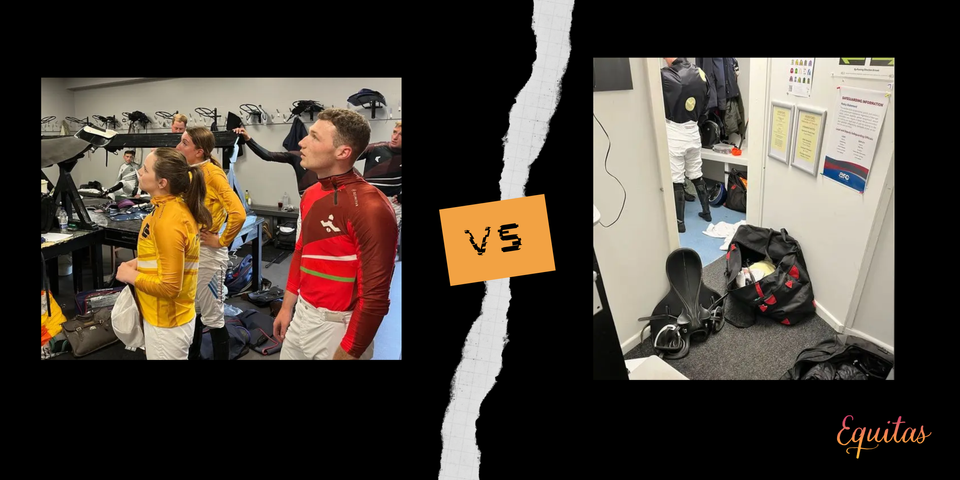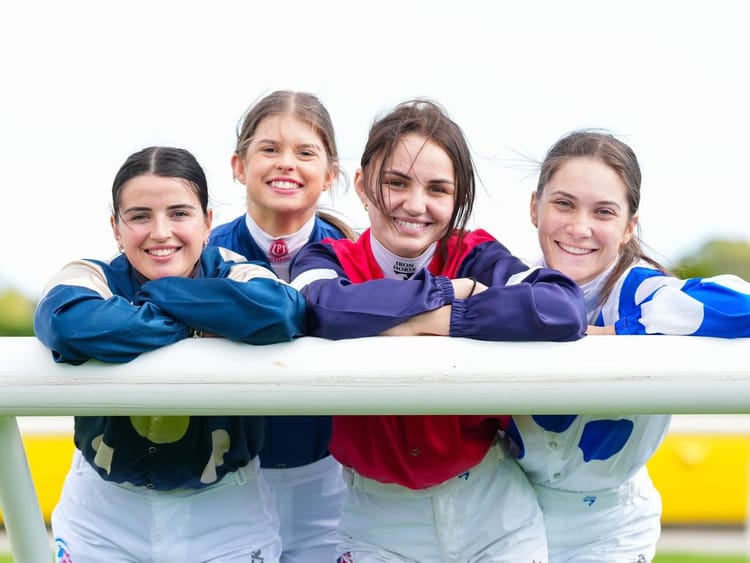Racing’s Dirty Secret: The Female Changing Rooms

There’s no disguising it — despite being hailed as elite athletes, many of Britain’s female jockeys are still changing in broom cupboards.
In 2025.
Cramped, damp, and often degrading, the state of female changing facilities across numerous UK racecourses has been described as “embarrassing”, “disgusting”, and in some cases, “like a prison cell”. This is not just a hygiene issue. This is not just a comfort issue. This is a matter of dignity and respect. And in 2025, it is nothing short of indefensible.
Female riders are expected to just “put up with it” in a male-dominated environment that isn’t fit for purpose.
The promise of a nationwide weighing room redevelopment project — once due to be completed in 2024 — has now been pushed back to 2030. That’s six more years where female riders are expected to just “put up with it” in a male-dominated environment that isn’t fit for purpose. And it’s six more years of watching young women enter a sport that still doesn’t offer them basic professional standards.
This isn’t about luxury. It’s about being able to do your job.
Temporary Measures? Or Just Temporary Excuses?
When female jockeys still have to step into male changing rooms just to access basic services like a valet, it begs the question — what exactly has changed since the high-profile case involving Bryony Frost and the fallout that followed?
According to the Professional Jockeys Association (PJA), not nearly enough.
Jump jockey and PJA board member Tabitha Worsley puts it plainly:
“The interim measures put us at a massive disadvantage. We still don’t get the same access to valets. The lads are respectful, but they shouldn’t have to have us in there. And we shouldn’t have to go in there.”
Former jockey Hayley Turner, who recently retired after 25 years in the saddle, said she’s “embarrassed” to explain to outsiders that female jockeys still have to use the men’s room. “It’s outdated and unfair. The only real solution is for every track to have a neutral valet area.”
While some racecourses have delivered on modernised, gender-equal facilities, others have barely scraped by with stopgap measures — outdoor scales, bell systems to summon a valet, and makeshift access routes that simply do not work. Jockeys are left navigating shared spaces where privacy is compromised and professionalism is undermined.
If any other industry expected its female staff to get changed beside a row of urinals, it would be national news.
From Broom Cupboards to Bench Hazards
Photos and rider testimonies reveal the bleak reality: changing rooms without hot water, mould on walls, broken benches that tip like see-saws, and showers that flood the space with condensation. At Lingfield, drainage issues have created an unbearable smell that both male and female jockeys have complained about — except, as Turner points out, “it’s worse for us because our room is so much smaller.”
In Bangor, a warm-up bike was placed in the female toilet. At Ludlow, the benches are so unstable they’ve been likened to school furniture. Kelso’s facilities are located in a Grade A listed building, but heritage status doesn’t excuse the fact that the female changing space is described as no more than a glorified cupboard.
There’s no getting around it — the contrast in facilities is discriminatory.
And Equitas isn’t in the business of ignoring discrimination.

“If We’re Equal on the Track, Why Not Off It?”
The British racing industry often boasts about its uniqueness — men and women competing equally, side by side. But what’s the point in celebrating equality in the saddle when it vanishes the moment they dismount?
PJA Chair Nick Attenborough calls it racing’s “dirty secret”, and he’s right. “Imagine a 17-year-old girl, about to have her first ride, being told she has to change in the men’s room. That’s humiliating. In no other sport or workplace would this be acceptable.”
And yet, the RCA insists it has “exceeded safeguarding requirements” — but if female athletes don’t feel safe, supported, or respected, how can any organisation say their work is done?
What’s clear is that the voices of the women most affected continue to be dismissed or downplayed. They’ve been told to be patient, to wait for facilities that are perpetually on the horizon. But justice delayed is justice denied — and it’s time to say enough is enough.
Investment Is Possible — So Why the Delay?
Fifteen racecourses have already upgraded their weighing rooms, proving this work is not only possible, but achievable at pace. So why are others lagging behind?
Funding is being cited as a major hurdle. Rising costs, overheads, and the need to balance prize money and other infrastructure projects have been mentioned. But as Equitas has always said — equity isn’t about convenience. It’s about priorities.
This is not a plea for extravagance.
It’s a call for parity.
Broadcaster and former rider Adele Mulrennan summed it up powerfully: “Jockeys can spend five or six hours in these rooms. They deserve to be safe, secure, and happy — not stuck in dark, dingy spaces feeling like second-class professionals.”
She’s not alone. As voices grow louder across racing, it’s clear the culture is shifting. And when riders start to feel empowered enough to speak up — when people like Hayley Turner and Tabitha Worsley refuse to stay silent — change becomes inevitable.
But change shouldn't take another six years.

What’s Next?
The PJA is pushing for the BHA to bring forward the completion date to 2026. Some are even calling for stricter licensing requirements — a move that would force racecourses to act faster or risk not being allowed to host fixtures. That kind of urgency is long overdue.
At Equitas, we’ve said it before: women in sport are not asking for special treatment. We’re asking for fairness. For basic respect. For equity.
This isn’t just about changing rooms — it’s about changing mindsets.
We stand with every jockey speaking out, every rider holding the line, and every young girl watching from the sidelines wondering if this sport has a place for her.
It does. But only if we build that place.





